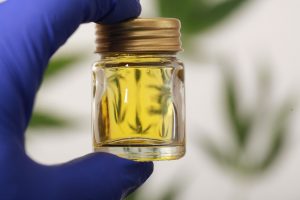Source: hempindustrydaily.com

When about 50 people in Utah fell ill last fall after consuming CBD, most of them through vaping, public health investigators were on the case.
What the epidemiologists found came as no surprise to people in the cannabis industry: The products, while labeled CBD, weren’t CBD at all – or any extract from hemp or marijuana. Instead, the products contained a synthetic cannabinoid called 4-cyano CUMYL-BUTINACA, or 4-CCB.
The illnesses prompted the nation’s top health agency, the U.S. Centers for Disease Control and Prevention, to issue a national health alert last month warning about “the hazards of consuming unregulated products labeled as CBD.”
The Utah cases drove home three problems for the emerging CBD industry:
Hemp Industry Daily interviewed CBD manufacturers and industry leaders about how the industry is affected by copycats and what can be done about it.

Tamar Wise
Why do people make fake CBD, and why is it a problem?
Tamar Wise, co-founder, Plant Consulting Group: “Most all medicine is from some natural something that we then bio-mimic in a lab. So with cannabis, because the plant is so prohibited, you have people making these synthetic versions to try to re-create the health benefits. But they don’t work. … There is no such thing as a good synthetic cannabinoid. Some of them can be hundreds of times stronger, latching onto the cannabinoid receptors in the body. It’s not natural. People have died. These things are dangerous.”
How does fake CBD affect other CBD producers?
Colleen Keahey, executive director, Hemp Industries Association: “They are a threat to the extent they are mischaracterizing themselves as being natural. They are putting a bad light on those that are true plant-derived products. The media outlets run the story, and then along with the story they show pictures of products that are natural, that do not contain fake CBD. So we get this confused state.”

Colleen Keahey
Michael Bronstein, co-founder, American Trade Association for Cannabis and Hemp: “From an industry perspective, this is tough because this has nothing to do with marijuana, yet people are selling product and calling it marijuana. This situation is akin to someone filling drinking bottles with gasoline and selling it under the label of ‘vodka.’”
Brady Madden, director of e-commerce, MHR Brands: “Stories about fake CBD, they do affect a company like ours. We do a ton of testing because it’s super important where your (CBD) source is coming from. And then when you have something happen like Utah, it gives the industry a bad name. People getting CBD, they don’t know where it comes from, they just know if it sucks. I don’t think fake CBD is hurting the industry to the point that it’s stifling it. But stories like that going out are not good.”

Alex Seleznov
Alex Seleznov, president, Pure Hemp Botanicals: “I don’t think there is a huge risk for loss of market share. I do think education, and articles like this, help prevent the spread of inappropriate news. Consumers should be realistic about price and dosage form. If the product isn’t healthy, CBD being in it is not going to make it healthy.”
What can the CBD industry do about fake products?
Jonathan Miller, attorney, U.S. Hemp Roundtable: “This is something we’ve really been focused on. It is so critical for any agricultural industry to have best practices and standards. It’s even more important for the hemp industry because of our family connection to marijuana. … What we’ve been doing is developing a guidance plan for the industry to develop standards and best practices. Not only would it provide strong self-regulation and have the highest standards for folks that participate, we would provide some sort of medallion or label that you could put on your products that would allow consumers to have confidence in what they’re buying.”

Michael Bronstein
Bronstein: “We’re partnering with ASTM (an international group that sets voluntary technical standards for a wide range of industries). We are working on coming up with standards. It’s very important. With marijuana, in places where it’s legal, that product is tested all the time. But CBD isn’t the same yet.”
Wise: “It’s frustrating. Because there are a lot of good groups trying to do what we need to do. But what we really need to do is merge everything into just one industry voice so that we can protect consumers as well as make sure that the industry is accepted as legitimate and safe.”
The CDC asked states to consider regulating CBD and “establishing surveillance systems for illness associated with products labeled as CBD.” In your opinion, is state CBD regulation imminent? What does that mean for the industry?
Bronstein: “If the industry doesn’t regulate itself, then people from outside will make the rules. Clearly, we’d prefer to make the rules, but a regulated market is coming.”

Brady Madden
Madden: “I would prefer the industry set a standard first. I’m a proponent of having less government involvement. That said, this is a side effect of prohibition. If we had the USDA involved, they could easily be able to oversee a program to make sure this product is safe and grown safely. Europe has been growing hemp for a long time, and they don’t have this problem, because in Europe it’s regulated like any other crop.”
Miller: “The primary regulator for other nutraceuticals is the FDA. We don’t want to see any overregulation, anything that makes it harder for people to access good products. In a perfect world, it’s going to be like most agricultural products, with industry standards to help consumers and government regulators to weed out bad actors.”
Keahey: “We don’t have to reinvent the wheel here. We can look at how other food products, other dietary products are produced for the market in an acceptable way and adhere to those guidelines.”
Interviews have been edited for length and clarity.
Kristen Nichols can be reached at kristenn@hempindustrydaily.com
No comments:
Post a Comment